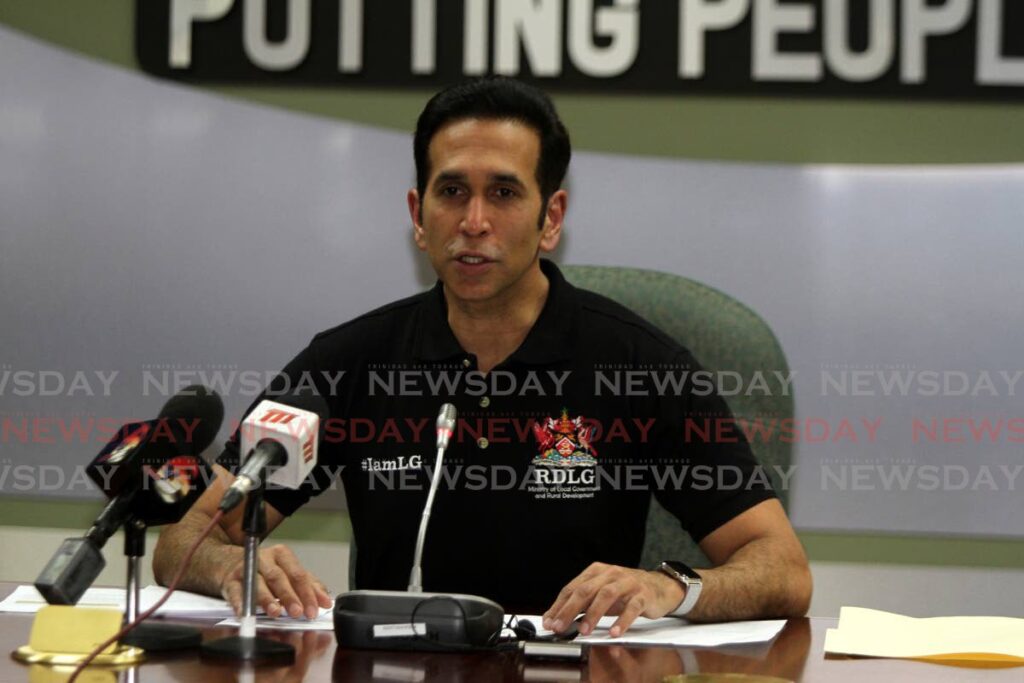UNC challenges local government reform in court

THE OPPOSITION UNC has made good on its threat to file legal action against the Government over its decision to proclaim parts of recently passed Local Government Reform Bill that could allow for local government elections to be delayed by a year. The bill passed on June 14 with a simple majority in Parliament.
On Tuesday, attorneys for activist Ravi Balgobin-Maharaj filed the claim in the High Court. Balgobin-Maharaj said, as a voter in the Maracas/Santa Margarita electoral district, he is aggrieved by the decision taken by Cabinet and announced recently by Local Government and Rural Development Minister Faris Al-Rawi.
Balgobin-Maharaj gave the Government until 4 pm on November 14 to return to the original period for holding the election – previously due between December 2022 and March 2023 – or he will go to court for judicial review relief.
The lawsuit said, “there is the real risk that councillors, aldermen, and mayors will be unlawfully occupying their respective offices from December 3, 2022.”
Now, he wants several orders and an injunction restraining all councillors and aldermen from acting beyond December 3.
The lawsuit contends the decision of the Cabinet was unauthorised, contrary to law and an abuse of power to “retrospectively apply an amendment to the law to increase the terms of councillors which ultimately delays the local government elections.”
The claim, which seeks declarations to put a stop to an alleged government plan to postpone the local election, said any attempt to delay it by retrospectively applying the amendments to the Municipal Corporations Act would be a fraud committed on the electorate, in bad faith, and would amount to improper use of the legislation.
Balgobin-Maharaj is also asking to court to quash the declaration that local government elections are now due between December 4, 2023, to March 4, 2024, and the decision to extend the term of office of all councillors and aldermen.
“The decision also denies the electorate of their legitimate expectation that the councillors (whom) they elected in 2019 would only be in office for a three-year term.
“Furthermore, those persons serving on the council have also been denied their legitimate expectation that they would only serve a three-year term.”
Any decision to change or amend the act, the lawsuit further contended, must be done expressly and unambiguously.
“In other words, whenever elections are to be denied or deferred it ought not to be done by inference, indirect consequence or implication. The laws ought to be interpreted in a way which facilitates the holding of elections unless the contrary intention is expressly shown.
“In a democratic society such as Trinidad and Tobago, laws must be interpreted and construed to facilitate the holding of elections; when elections are to be postponed(which should only be done in the most exceptional circumstances), the relevant legislative enactment must be unambiguous and express in its language, intent, and purport.”
It also said it was “inherently wrong” for the Government to amend the law “under the guise of local government reform, only to attempt to apply those amendments implicitly in a piecemeal and retrospective manner to alter the terms of the council which was elected in 2019 under and by virtue of the law that existed at the material time.”
It added, “The effect of the Government’s interpretation of the law is to extend the life of the current council by one year.
It contends the electorate is being denied its right to vote in elections for that period by amendments which do not state on their face that it is to have a retrospective effect, and which clearly ought not to be interpreted in that manner.
It argued, “An analysis of whether the amendments have retrospective effect must be conducted subject to the constitutional significance of the right to vote.”
The lawsuit alleged the action of the minister and Cabinet “has given rise to the understandable perception that the Government is abusing its power to avoid and/or delay the local government elections in light of its poor ratings.”
It also mentioned amendments contemplated by the Patrick Manning-led administration to extend the term of councillors, but said the proposed amendments did not seek to retrospectively alter the law.
“Whilst the Manning administration took the bull by the horns and squarely promoted and confronted the true policy, purport and intent of these amendments, the present government is trying to secure an unlawful postponement of the local government elections through the back door by surreptitiously purporting to increase the term of office for councillors and aldermen by one year thereby indirectly allowing the Government to postpone the local government elections by one year to avoid facing the electorate.”
Balgobin-Maharaj is represented by Anand Ramlogan, SC, Renuka Rambhajan, Jayanti Lutchmedial, Robert Abdool-Mitchell, Natasha Bisram, and Vishaal Siewsaran.
In a pre-action protocol letter sent last week to the Prime Minister, Attorney General and Al-Rawi, Balgobin-Maharaj said he had grown frustrated by the poor representation in his district.
“The electoral district continues to have numerous potholes, the drains are not regularly cleaned, the environment is unkempt, and when it rains there is widespread flooding and mosquitoes in the area.”
He said he was looking forward to the local government elections “to vote for a new representative in hope that better representation could be provided for the burgesses of the electoral district of Maracas/Santa Margarita.”


Comments
"UNC challenges local government reform in court"